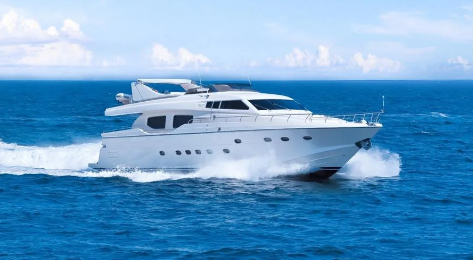What types of ships are marine air conditioners suitable for?
As an important part of the ship's internal environmental control, the marine air conditioning system has been applied to various types of ships. From luxury cruise ships to cargo ships, fishing boats, and even special-purpose scientific research ships, the application requirements and design requirements of marine air conditioning on different types of ships are different. This article will discuss in detail what types of ships marine air conditioning is suitable for, as well as the characteristics and requirements that need to be paid attention to when using marine air conditioning on different types of ships.
1. Basic functions and importance of marine air conditioning
The marine air conditioning system is mainly used to adjust the temperature, humidity, and air quality in the cabin to ensure the comfort and health of crew members and passengers. Especially during long-term voyages, the stable operation of air conditioning is particularly important. A good air conditioning system can effectively reduce the humidity in the ship and prevent equipment corrosion and mold growth caused by excessive moisture in the air. At the same time, air conditioning can also provide a comfortable working and living environment in high temperatures or extremely cold weather, reduce crew fatigue, and improve work efficiency.
The marine air conditioning system is generally composed of multiple functional modules such as refrigeration, heating, dehumidification, and air filtration. The design and configuration of the air conditioning system are different for different types of ships. These differences are mainly reflected in capacity, energy efficiency, noise control, corrosion resistance, space adaptability,y and other aspects.
2. Types of ships suitable for marine air conditioning
Luxury cruise ships and passenger ships
Luxury cruise ships are typical representatives of marine air conditioning applications. Cruise ships usually need to provide a comfortable living environment for a large number of passengers, so the air conditioning system needs to have efficient cooling and heating capabilities to cope with temperature changes in different climate zones. The air conditioning system of a cruise ship is often distributed, capable of adjusting the temperature for each cabin individually while maintaining the comfort of the ship's public areas (such as restaurants, leisure areas, decks, etc.). Due to the complex structure and multi-functional use of cruise ships, the air conditioning system also needs to have strong adaptability and reliability.
On cruise ships, air conditioning not only needs to meet the basic needs of cooling and heating but also must have an efficient air purification system. The air at sea contains high salt and moisture, and the air conditioning system must have an anti-corrosion and moisture-proof design. In order to improve the efficiency of the air conditioning system, the common air conditioning systems on cruise ships are mostly intelligent and remotely controlled systems, which can realize real-time monitoring and adjustment of environmental parameters such as temperature and humidity.
Freight ships
Freight ships such as container ships, tankers, and bulk carriers usually have long sailing times, large cabin spaces, and a small number of crew members, so the configuration of air-conditioning systems pays more attention to energy saving and efficiency. The air-conditioning system on a freight ship is generally a central air-conditioning system that can deliver air to each cabin through pipes. During long-distance voyages, the comfort of the crew's working and resting environment is crucial to ensuring navigation safety, so the air-conditioning system of a freight ship is usually installed in the cabin and cockpit to ensure the comfort of the crew in bad weather conditions.
Freight ships require higher energy efficiency in the design of air-conditioning systems because these ships have long sailing times and energy consumption directly affects operating costs. In addition, during the transportation of goods, some goods (such as food, medicine, etc.) have strict requirements on the temperature and humidity of the cabin, so some freight ships will also be equipped with special temperature-controlled air-conditioning systems to ensure the safe transportation of goods.

Fishing boats
Fishing boats usually operate for a long time at sea, and the living conditions of the crew are relatively simple. The demand for air-conditioning systems on fishing boats is more focused on improving the working and living environment of the crew. The main function of the air conditioning system of a fishing boat is to control the temperature and humidity in the cabin, prevent the growth of mold, and eliminate the humid climate brought by water vapor and sea breeze.
Because fishing boats have a small space and carry a lot of cargo, their air conditioning systems are often compact, usually using split air conditioners or small central air conditioning systems. This type of air conditioning system needs to have high salt corrosion resistance and waterproof performance to cope with the harsh conditions in the marine environment. In addition, fishing boats have high requirements for the noise of air conditioning. When the crew works in the cabin for a long time, low-noise air conditioning can effectively improve the quality of life.
Military ships
The air conditioning system design requirements of military ships are high, because it not only needs to provide a comfortable working and living environment for the crew but also needs to ensure high reliability in wartime or severe weather conditions. The air conditioning system of military ships usually needs to have strong protection functions and be able to cope with various extreme environments, such as high temperature, low temperature, high humidity, strong salt spray, etc.
In addition, the air conditioning system on military ships must have an efficient air purification function to prevent the air in the ship from being contaminated by chemical, biological, or radioactive substances. The installation location and maintenance convenience of air-conditioning equipment are also important considerations in the design of air-conditioning systems for military ships. The equipment needs to be compact and easy to maintain.
Research ships and survey ships
Research ships and survey ships usually need to conduct long-term scientific research in sea areas far from land, and the crew and researchers stay on board for a long time, so the design of the air-conditioning system needs to consider the special needs of the ship. The requirements for air-conditioning systems of such ships include stability, noise control, temperature and humidity regulation, and air filtration.
The air-conditioning system of a research ship not only needs to provide a comfortable living environment but also needs to ensure temperature and humidity control in sensitive areas such as laboratories and instrument cabins. Some research ships need to deal with special climate and environmental factors, so the air-conditioning system may need to have more personalized functions, such as refrigeration and constant temperature.
Oilfield support ships and drilling ships
The air-conditioning system of oilfield support ships and drilling ships is mainly to meet the work and life needs of crew members in extreme environments. Such ships usually work in areas with frequent storms at sea and drastic climate changes, so their air-conditioning systems need to have strong adaptability and high energy efficiency.
Oilfield support ships and drilling ships usually use large central air-conditioning systems to provide cold or hot air to different areas through pipes. These systems need to have high corrosion resistance and waterproof functions to ensure long-term stable operation in the marine environment.
3. Design and selection considerations for marine air conditioners
Different types of ships have different requirements for air conditioning systems, so when choosing marine air conditioners, the following factors need to be considered comprehensively:
Space and layout: Choose the appropriate air conditioning system configuration according to the type and size of the ship. Large space ships usually use central air conditioning systems, while small ships mostly use split or window air conditioners.
Corrosion resistance: The salt spray and moisture in the marine environment are extremely corrosive to the air conditioning system, so the marine air conditioning system must use anti-corrosion materials and have good moisture resistance.
Energy efficiency: Long-term navigation and frequent use of air conditioning make energy consumption a key factor. Choosing an energy-efficient air conditioning system is crucial to reducing operating costs.
Noise control: The ship has a small space, so noise control is particularly important, especially for air conditioning systems in living and working areas, to minimize noise pollution.
Environmental adaptability: The operation of different ships under different climatic conditions requires the air conditioning system to have strong environmental adaptability to ensure stable operation in extreme environments such as high temperature, low temperature, and high humidity.
The selection and design of marine air conditioning systems involve many aspects of consideration, including ship type, operating environment, crew needs, etc. With the continuous advancement of technology, the intelligence, energy saving, and multifunctionality of marine air conditioning systems are becoming the future development trend. Whether it is a luxury cruise ship, a cargo ship or a fishing boat, a suitable air conditioning system can improve the work efficiency of the crew, ensure the safe operation of the ship, and enhance the comfort experience of passengers.
As a marine air conditioning provider, we are well aware of the diverse needs of different types of ships for air conditioning systems. Whether it is a cargo ship, a cruise ship, a fishing boat or a special ship, we can provide customized air conditioning solutions to ensure that the crew and passengers can enjoy a comfortable and healthy environment under various sailing conditions. Our air conditioning system is not only efficient and energy-saving, but also has powerful moisture-proof, dust-proof and sound-proof functions to meet the special requirements of various types of ships. Choose us to make your sea journey more secure and enjoyable.
www.kmevehicleac.com
Taicang Kyowa Mechanical & Electrical Co.,Ltd.

